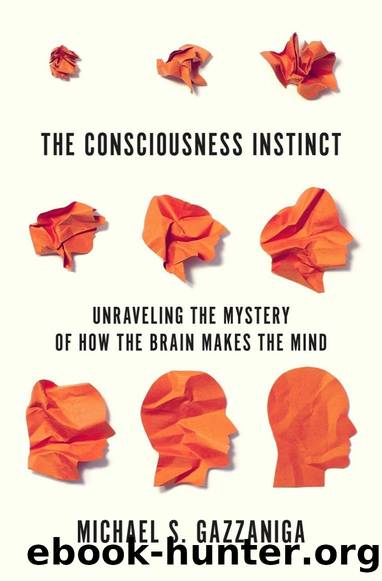The Consciousness Instinct: Unraveling the Mystery of How the Brain Makes the Mind by Michael S. Gazzaniga

Author:Michael S. Gazzaniga [Gazzaniga, Michael S.]
Language: eng
Format: epub
ISBN: 9780374538156
Google: _VkqtwEACAAJ
Barnesnoble:
Publisher: Farrar, Straus and Giroux
PART III:
CONSCIOUSNESS COMES
7.
THE CONCEPT OF COMPLEMENTARITY: THE GIFT FROM PHYSICS
Those who are not shocked when they first come across quantum theory cannot possibly have understood it.
âNeils Bohr
IN 1868, THE physicist, mountaineer, educator, and professor at the Royal Institution John Tyndall gave a talk to the mathematical and physical section of the British Association for the Advancement of Science. In it, he laid out the following dilemma:
The passage from the physics of the brain to the corresponding facts of consciousness is unthinkable. Granted that a definite thought, and a definite molecular action in the brain occur simultaneously; we do not possess the intellectual organ, nor apparently any rudiment of the organ, which would enable us to pass, by a process of reasoning, from the one to the other.⦠âHow are these physical processes connected with the facts of consciousness?â The chasm between the two classes of phenomena would still remain intellectually impassable.1
Here we are, 150 years later, and we are not quite as far as we would like to be. We understand, to some extent, the electric discharges, the groupings and flow of molecules, and sometimes even corresponding brain states, especially in the study of vision. Unlike Tyndall, however, I think we do have an organ that is up to the task. What is needed is to apply the right kinds of ideas to the problem of determining how mind comes from brain. How do we think about that pesky gap between our biology and our mind?
It is commonly recognized that the chasm or gap is a problem. It was only twenty-five years ago that the philosopher Joseph Levine officially dubbed it the explanatory gap, which he later described in his book Purple Haze:
We have no idea, I contend, how a physical object could constitute a subject of experience, enjoying, not merely instantiating, states with all sorts of qualitative character. As I now look at my red diskette case, Iâm having a visual experience that is reddish in character. Light of a particular composition is bouncing off the diskette case and stimulating my retina in a particular way. That retinal stimulation now causes further impulses down the optic nerve, eventually causing various neural events in the visual cortex. Where in all of this can we see the events that explain my having a reddish experience? There seems to be no discernible connection between the physical description and the mental one, and thus no explanation of the latter in terms of the former.2
Levine leaves us with an unbridged chasm between the physical level of interacting neurons and the seemingly nebulous level of conscious experience. We may explain, for example, that pain is caused by the nervous systemâs firing of C fibers, and why there is a delay between withdrawal and the feeling of pain, but explaining the causal relationship tells us nothing about the feeling of pain itself, that subjective experience.
The current state of the mind/body problem rests on two plausible yet seemingly incompatible propositions: (1) Some form of materialism or physicalism is true.
Download
This site does not store any files on its server. We only index and link to content provided by other sites. Please contact the content providers to delete copyright contents if any and email us, we'll remove relevant links or contents immediately.
Periodization Training for Sports by Tudor Bompa(8254)
Why We Sleep: Unlocking the Power of Sleep and Dreams by Matthew Walker(6706)
Paper Towns by Green John(5179)
The Immortal Life of Henrietta Lacks by Rebecca Skloot(4580)
The Sports Rules Book by Human Kinetics(4379)
Dynamic Alignment Through Imagery by Eric Franklin(4208)
ACSM's Complete Guide to Fitness & Health by ACSM(4057)
Kaplan MCAT Organic Chemistry Review: Created for MCAT 2015 (Kaplan Test Prep) by Kaplan(4009)
Introduction to Kinesiology by Shirl J. Hoffman(3766)
Livewired by David Eagleman(3765)
The Death of the Heart by Elizabeth Bowen(3610)
The River of Consciousness by Oliver Sacks(3599)
Alchemy and Alchemists by C. J. S. Thompson(3516)
Bad Pharma by Ben Goldacre(3422)
Descartes' Error by Antonio Damasio(3271)
The Emperor of All Maladies: A Biography of Cancer by Siddhartha Mukherjee(3155)
The Gene: An Intimate History by Siddhartha Mukherjee(3095)
The Fate of Rome: Climate, Disease, and the End of an Empire (The Princeton History of the Ancient World) by Kyle Harper(3055)
Kaplan MCAT Behavioral Sciences Review: Created for MCAT 2015 (Kaplan Test Prep) by Kaplan(2984)
